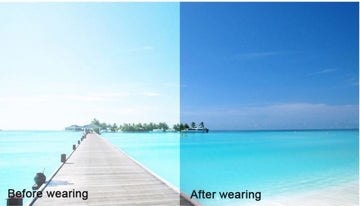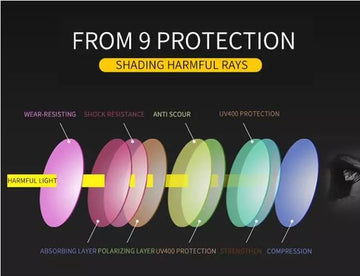
In the same way that ultraviolet (UV) radiation from the sun can damage your skin, it can also wreak havoc with your vision. Specifically, UV rays can damage the eye’s surface tissues, the cornea and lens. And over time, that damage can lead to cataracts, cancers of the eye, and AMD (Age-related macular degeneration).
Did you know that you can actually develop a sunburn on your eyes? It's called photokeratitis. It can be extremely painful and leave you with permanent eye damage. To help prevent eye damage you should wear sunglasses during all daylight hours. This is true in the summer, winter, and even when it's cloudy.
Are light color eyes more susceptible to sun damage than brown eyes?
Eye color itself does not determine susceptibility to sun damage; rather, it's the amount of melanin in the eye that plays a role in protecting against the harmful effects of UV radiation from the sun. Melanin is a pigment that provides some natural protection against UV rays by absorbing and scattering them.
Generally, people with lighter-colored eyes, such as blue or green, have less melanin in their iris compared to those with darker-colored eyes, like brown. As a result, individuals with lighter eye colors may be somewhat more susceptible to the harmful effects of UV radiation on their eyes, including an increased risk of conditions like cataracts and macular degeneration. However, the overall susceptibility to sun damage depends on various factors, including the person's genetics, the amount of time spent in the sun, and the use of protective measures like sunglasses and hats.
What parts of the eye can become damaged by sun exposure?
Sun exposure can potentially damage several parts of the eye, including:
-
Cornea: The cornea is the clear, front part of the eye that covers the iris and pupil. Excessive sun exposure can lead to a condition called photokeratitis or "corneal sunburn," which can cause pain, redness, tearing, and temporary vision loss. This condition is often compared to a sunburn on the surface of the eye.
-
Lens: Prolonged exposure to UV radiation can contribute to the development of cataracts. Cataracts are a clouding of the eye's natural lens, which can lead to blurred vision and, if left untreated, significant vision impairment.
-
Retina: The retina is the light-sensitive tissue at the back of the eye responsible for vision. Long-term exposure to UV rays may increase the risk of age-related macular degeneration (AMD). AMD is a leading cause of vision loss among older adults.
-
Eyelids: The skin on the eyelids is thin and delicate, making it susceptible to sun damage. Excessive sun exposure can lead to skin cancer on the eyelids, such as basal cell carcinoma, squamous cell carcinoma, or melanoma.
How do sunglasses protect your eyes?
Sunglasses protect the eyes in several ways. Since it's very difficult to apply sunscreen on your eyelids and the sensitive areas around your eyes, sunglasses will act as a physical barrier blocking UV rays from the sensitive areas around the eyes. Also, the lenses of the sunglasses must have 100% UVA and UVB protection. Verify if sunglasses will protect your eyes, by checking the tag or sticker to make sure the glasses provide 100% UV protection. It may also say, ‘UV absorption up to 400 nm,’ which is the same as 100% UV protection.
What about UV blocking contact lenses?
Even if you wear contact lenses with UV-blocking technology, you should still wear sunglasses outdoors. According to the American Academy of Ophthalmology, these contacts protect only the part of the eye they cover, leaving the outside of the eye exposed to harmful radiation. Your eyes get the most protection when you wear sunglasses, especially wraparound styles.
In Summary
To protect your eyes from sun damage, it's essential to wear sunglasses that provide adequate UV protection (look for sunglasses that block 100% of UVA and UVB rays), wide-brimmed hats, and avoid prolonged exposure to direct sunlight, especially during peak UV hours. Regular eye exams can help detect and address potential issues caused by sun damage or other factors.
For more information about Fish 419's complete line of sunglasses, follow this LINK
- 100% UV,
- Blog,
- eye health,
- protection,
- sun,
- sunglasses,
- UV,
- UVA,
- UVB











